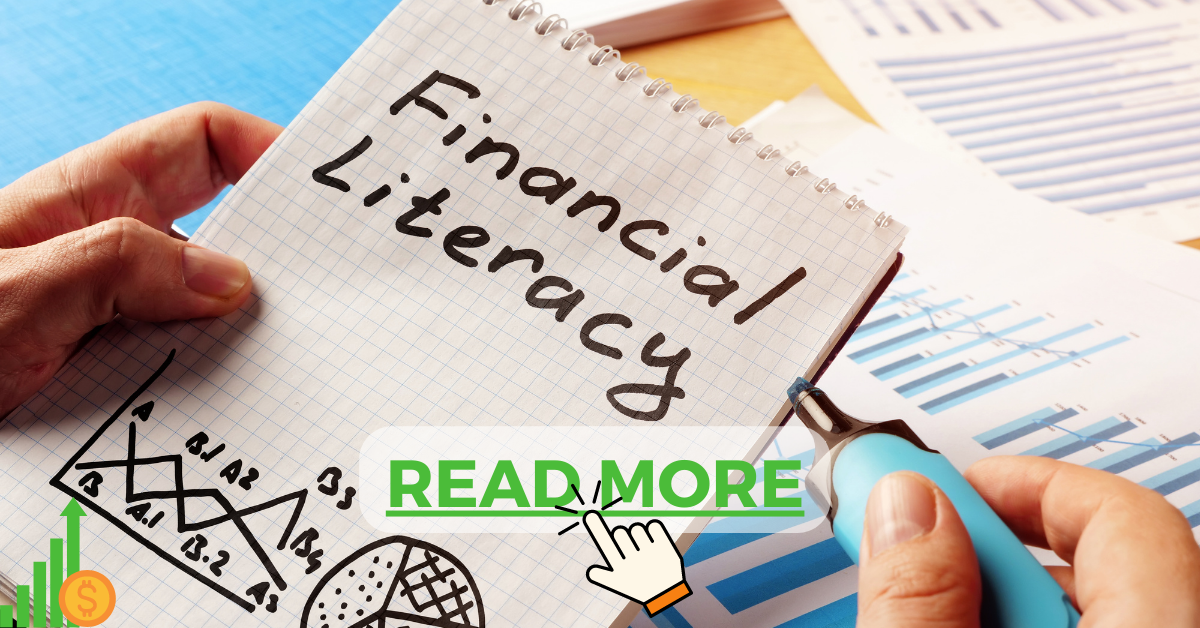What is Financial Literacy in a Nutshell? Learn the Basics!
Managing your money can be a daunting task, and it requires a certain level of financial literacy to make informed decisions. Simply put, financial literacy is the ability to understand and manage your personal finances effectively. It involves having the knowledge, skills, and confidence to make sound financial decisions and navigate complex financial situations.
Financial literacy is essential for everyone, regardless of their income level or financial goals. It empowers you to take control of your money, make informed decisions, and achieve financial well-being. By understanding the basics of financial literacy, you can develop a solid foundation for managing your money and building wealth.
Key Takeaways
- Financial literacy is the ability to understand and manage personal finances effectively.
- It empowers individuals to take control of their money, make informed decisions, and achieve financial well-being.
- Developing a foundation of financial literacy is essential for managing money effectively and building wealth.
Why is Financial Literacy Essential? Four Key Reasons
Financial literacy is more than just being able to balance a checkbook. It is a crucial component of financial empowerment and decision-making. Here are four key reasons why financial literacy is essential:
- Empowerment: Being financially literate empowers you to take control of your finances. When you understand financial concepts and terminology, you can make informed decisions about your money, such as creating a budget and saving for the future.
- Financial well-being: Financial literacy can improve your overall financial well-being. By understanding how to manage debt and credit, you can build and maintain good credit, which can lead to better access to loans and more favorable interest rates.
- Complex financial situations: Financial literacy is especially important when faced with complex financial situations, such as buying a house or planning for retirement. With a solid foundation of financial knowledge, you can make informed decisions and avoid costly mistakes.
- Financial independence: Ultimately, financial literacy can lead to financial independence and security. By developing good financial habits and making smart decisions, you can achieve your financial goals and build long-term wealth.
Financial literacy is a key component of financial education and empowerment. By developing your financial knowledge and skills, you can take control of your finances and achieve a more secure and prosperous future.

The Basics of Financial Literacy
Financial literacy is the foundation of effective money management. It encompasses a range of skills and knowledge that enable individuals to make informed decisions about their finances. Whether you are saving for a rainy day or planning for retirement, being financially literate is essential for achieving your financial goals.
Budgeting
At the core of financial literacy is the ability to create and manage a budget. A budget is a plan that helps you keep track of your income and expenses. By creating a budget, you can identify areas where you can cut back on expenses and save more money. It also helps you prioritize your spending and avoid overspending.
“A budget is telling your money where to go instead of wondering where it went.” – Dave Ramsey
A budget can be created using a spreadsheet or budgeting app. Start by listing your sources of income and then categorizing your expenses, such as housing, transportation, food, and entertainment. Be sure to include both fixed expenses (such as rent or mortgage payments) and variable expenses (such as groceries or entertainment).
Saving
Saving is a crucial component of financial literacy. It involves setting aside a portion of your income for future needs or emergencies. By saving regularly, you can build an emergency fund, pay off debt faster, and achieve your long-term financial goals.
Experts recommend saving at least 20% of your income, but any amount is better than nothing. You can automate your savings by setting up a direct deposit or transfer to a savings account each month.
The earlier you start saving, the more time your money has to grow. Even small amounts saved regularly can add up over time and make a big difference in your financial well-being.
Investing
Investing is a powerful tool for building long-term wealth. It involves putting your money to work by purchasing assets that have the potential to grow in value over time. Investing can be risky, but it also offers the potential for higher returns than leaving your money in a savings account.
Before investing, it is important to understand the different types of investments and the associated risks and rewards. Consider consulting with a financial advisor or doing your research to identify investments that align with your financial goals and risk tolerance.
Remember, investing is a long-term strategy that requires patience and discipline. Avoid making emotional decisions based on short-term market fluctuations, and focus on your long-term financial goals.
Debt Management
Managing debt is a critical aspect of financial literacy. Debt can be a useful tool for achieving financial goals, such as buying a home or starting a business. However, if not managed properly, debt can quickly spiral out of control and become a burden.
To manage debt effectively, it is important to understand the different types of debt, such as credit card debt, student loans, and mortgages. Each type of debt has its own terms and interest rates, which can impact your overall financial situation.
Develop a plan for paying off your debt, starting with high-interest debt first. Consider making extra payments or consolidating your debts to reduce interest charges. Avoid taking on new debt unless it is necessary for achieving your financial goals.

Being financially literate is not a one-time event; it is an ongoing process of learning and growing. By mastering the basics of financial literacy, you can take control of your financial future and achieve the life you envision.
How to Be Financially Smart: Tips for Strong Financial Health
Managing your finances can be overwhelming, but with some simple tips, you can develop a strong financial foundation. By following these practical strategies, you can make smart financial decisions that will benefit you in the long run.
Create a Budget
One of the most important steps in achieving financial health is creating a budget. Take the time to track your income and expenses to determine where your money is going. This will help you identify areas where you can cut back and save more money. Set realistic goals and make adjustments as necessary.
Track Your Expenses
Tracking your expenses is essential in understanding your spending habits and identifying areas where you can improve. Use a spreadsheet or budgeting app to keep track of your spending. Review your expenses regularly to ensure you stay within your budget.
Save Money
Saving money is crucial in achieving financial security. Set aside a portion of your income for emergencies and future goals. Consider opening a savings account or investing in a retirement fund to maximize your savings.
Develop Good Financial Habits
Developing good financial habits can make a significant impact on your financial health. Avoid unnecessary expenses, pay your bills on time, and keep your credit in good standing. These small changes can help you achieve your financial goals.
Set Financial Goals
Setting financial goals is critical in achieving long-term financial success. Determine what you want to achieve and create a plan to get there. Whether it’s saving for a down payment on a house or paying off debt, having a specific goal will help you stay motivated and on track.

By following these tips for strong financial health, you can take control of your finances and make informed decisions. Remember that financial literacy is a continuous learning process, and it’s never too late to start.
Improving Your Financial Situation: Steps to Take
If you’re looking to improve your financial situation, there are several steps you can take to achieve greater financial stability and security. By developing strong financial habits and making savvy financial decisions, you can grow your wealth and achieve your long-term financial goals. Here are some strategies you can use to improve your financial situation:
Create a Budget
One of the most important steps you can take towards improving your financial situation is to create a budget. A budget can help you track your expenses and identify areas where you can cut costs and save money. Start by listing all your monthly expenses, including rent or mortgage payments, utilities, groceries, and other bills. Then, compare your income to your expenses and look for ways to reduce your expenses or increase your income. Even small changes, such as cutting back on dining out or negotiating your bills, can make a big difference over time.
Pay Down Debt
If you have debt, such as credit card balances or loans, it’s important to prioritize paying it down. High levels of debt can eat away at your income and make it challenging to achieve your financial goals. Consider creating a debt repayment plan that allows you to pay off your debts systematically, starting with the highest interest rate debts first. You may also want to consider consolidating your debts into a single payment with a lower interest rate, which can help you save money on interest charges over time.
Build an Emergency Fund
Building an emergency fund is an essential step towards achieving financial stability and security. An emergency fund is a savings account that you can tap into during unexpected financial challenges, such as a job loss or medical emergency. Aim to save at least three to six months’ worth of living expenses in your emergency fund, and keep it in a separate account that’s easily accessible in case of emergency.
Invest in Your Future
To achieve long-term financial success, it’s important to invest in your future. Start by contributing to a retirement account, such as a 401(k) or IRA, which can help you grow your wealth over time. You may also want to consider investing in stocks, bonds, or other investments, which can provide higher returns than traditional savings accounts. However, it’s important to consult with a financial advisor before making any investment decisions, to ensure that you’re making smart and informed choices.

By following these steps and making smart financial decisions, you can improve your financial situation and achieve your long-term financial goals. Remember, financial literacy is the key to financial empowerment and success. Make a commitment to continue learning about personal finance and money management, and seek out resources that can help you achieve your financial dreams.
Self-Teaching Financial Literacy: Where to Start
If you’re interested in improving your financial literacy but don’t know where to begin, there are many resources available to help you get started. With a little time and effort, you can teach yourself the fundamentals of personal finance and money management.
One great way to start learning about financial literacy is by reading books on personal finance. There are many excellent books available on the topic that can help you develop a strong foundation of knowledge. Some popular titles include:
- The Total Money Makeover by Dave Ramsey
- Your Money or Your Life by Vicki Robin and Joe Dominguez
- The Simple Path to Wealth by JL Collins
You can also find a wealth of information online through courses, podcasts, and websites. Online courses, such as those offered by Coursera and Udemy, can provide structured learning experiences and certificates upon completion.
Podcasts are another great way to learn about personal finance and money management. Some popular shows include:
- The Dave Ramsey Show
- The Clark Howard Show
- So Money with Farnoosh Torabi
Finally, there are many websites that offer comprehensive information on personal finance and money management. Some great ones to check out include:

Remember, the key to developing strong financial literacy skills is to start small and build your knowledge over time. By taking advantage of the many resources available to you, you can gain the skills and confidence you need to make informed financial decisions and achieve your financial goals.
Is Financial Literacy a Hard Skill?
When it comes to the classification of skills, financial literacy is often debated whether it should be considered a hard skill or a soft skill. A hard skill is one that is based on technical knowledge and can be objectively measured, while a soft skill is more subjective and based on personal attributes such as communication, leadership, and problem-solving.
Financial literacy encompasses both technical knowledge and behavioral aspects of financial decision-making, making it a hybrid skill that falls somewhere between hard and soft skills. On one hand, financial literacy requires an understanding of financial concepts such as budgeting, investing, and debt management, which can be objectively measured. On the other hand, financial decision-making involves personal values, emotions, and biases, which make it a more subjective skill.
However, regardless of the classification, it is clear that financial literacy is a crucial skill for personal financial success and empowerment. By acquiring financial knowledge and developing good financial habits, individuals can make informed decisions about managing their money and working towards their financial goals.

Therefore, instead of getting caught up in the debate of whether financial literacy is a hard or soft skill, it is more important to focus on developing a well-rounded financial education that encompasses both technical and behavioral aspects.
Growing Financially: Strategies for Long-Term Success
To achieve long-term financial success, it is important to develop a plan that considers your current financial situation and aligns with your future goals. Here are some strategies to help you grow financially:
Investing
Investing is an effective way to grow your wealth over time. Consider investing in stocks, mutual funds, or exchange-traded funds (ETFs) to diversify your portfolio and minimize risk. It is important to conduct thorough research before investing and consult with a financial advisor if needed.
Retirement Planning
Planning for retirement is essential to ensure a financially secure future. Consider contributing to a 401(k) or IRA and taking advantage of employer matching contributions. It is also advisable to review your retirement plan periodically and make adjustments as necessary.
Building Wealth
Building wealth involves creating a diversified portfolio of assets that generate income and appreciate over time. Consider investing in real estate, starting a business, or building a passive income stream to increase your net worth.

Adapting to Changing Financial Circumstances
Life is unpredictable, and financial circumstances can change quickly. It is important to be prepared for unexpected events such as job loss, health issues, or economic downturns. Consider building an emergency fund and having a solid financial plan in place to weather any storms that may arise.
By implementing these strategies, you can set yourself on a path towards long-term financial growth and success. Remember to stay informed and adapt your plan as needed to ensure you are always moving in the right direction.
Conclusion
Congratulations! You have now gained a better understanding of the importance of financial literacy and how it can benefit you in managing your money effectively. By improving your financial education, you have taken a step towards financial empowerment and security.
Remember, financial literacy is an ongoing journey, and there is always more to learn. Keep seeking opportunities to improve your financial skills and knowledge. By setting financial goals and making informed financial decisions, you can achieve long-term financial success and prosperity.
FAQ
Q: What is Financial Literacy in a Nutshell?
A: Financial literacy refers to having the knowledge, skills, and understanding necessary to make informed financial decisions. It encompasses various aspects of personal finance, including money management, budgeting, investing, and debt management.
Q: Why is Financial Literacy Essential? Four Key Reasons
A: Financial literacy is essential for several reasons. Firstly, it empowers individuals to make informed decisions about their money, leading to better financial outcomes. Secondly, it enhances financial well-being by promoting financial independence and security. Thirdly, it helps individuals navigate complex financial situations, such as buying a house or planning for retirement. Lastly, financial literacy is crucial for effective financial decision-making, allowing individuals to identify and seize opportunities for growth and wealth creation.
Q: What are the Basics of Financial Literacy?
A: The basics of financial literacy include understanding concepts such as budgeting, saving, investing, debt management, and the importance of financial products and services. Developing these fundamental skills empowers individuals to make sound financial decisions and achieve their financial goals.
Q: How can I Be Financially Smart? Tips for Strong Financial Health
A: To be financially smart, it is important to create a budget, track expenses, save money regularly, and develop good financial habits. Setting financial goals and making smart financial decisions contribute to long-term financial health and well-being.
Q: How can I Improve My Financial Situation? Steps to Take
A: Improving your financial situation involves reducing debt, increasing income, creating an emergency fund, and developing a long-term financial plan. By implementing these steps and utilizing financial literacy skills, you can take control of your finances and work towards a more secure future.
Q: Where to Start with Self-Teaching Financial Literacy?
A: There are various resources available for self-teaching financial literacy. These include books, online courses, podcasts, and reputable websites that offer comprehensive information on personal finance and money management. By utilizing these resources, you can enhance your financial knowledge and skills.
Q: Is Financial Literacy a Hard Skill?
A: The nature of financial literacy is debated, with arguments for it being considered both a hard skill and a soft skill. While financial literacy involves technical knowledge and skills, it also requires behavioral aspects such as decision-making and risk assessment. Therefore, it can be considered a combination of both hard and soft skills.
Q: What are Strategies for Long-Term Financial Success?
A: Strategies for long-term financial success include investing, retirement planning, building wealth, and adapting to changing financial circumstances. By implementing these strategies and utilizing financial literacy, you can achieve financial security and abundance over time.


